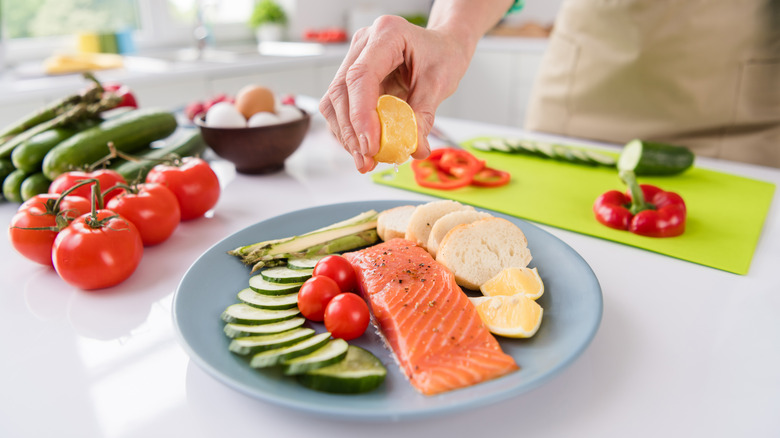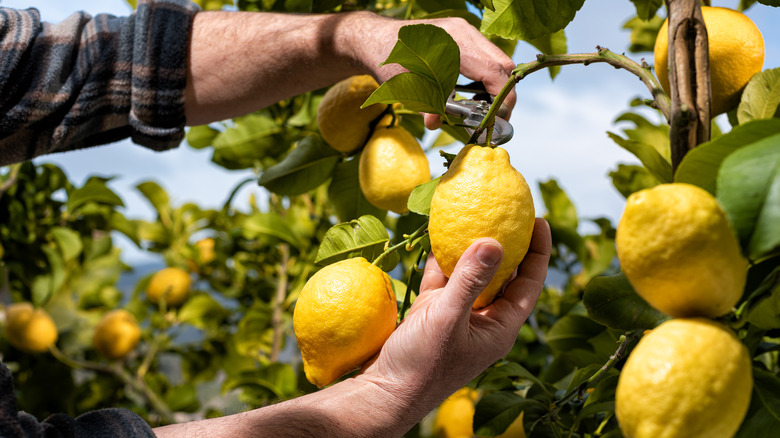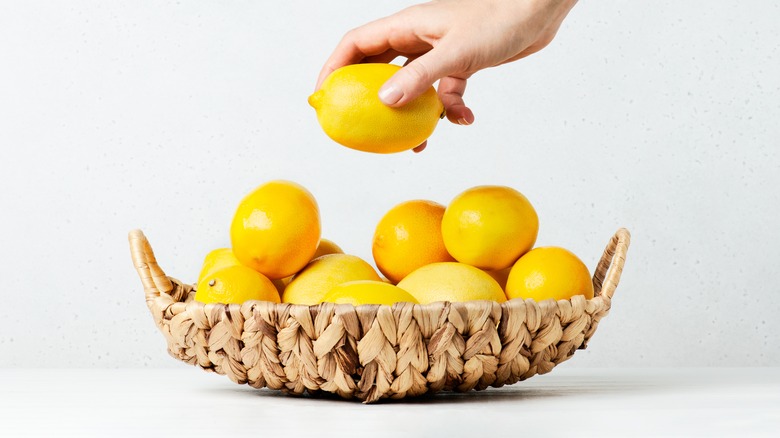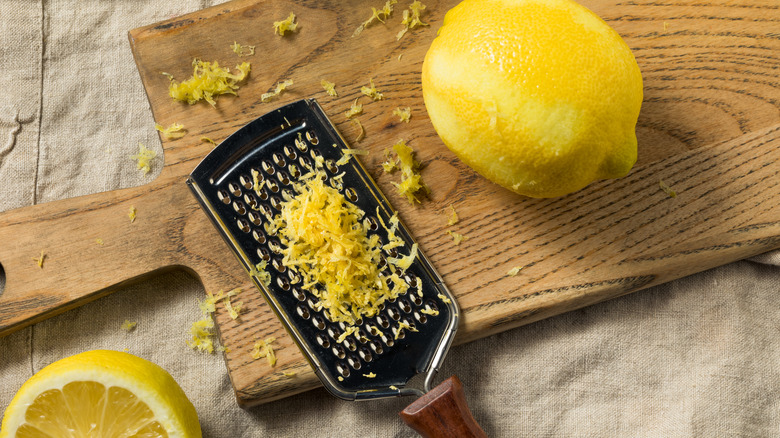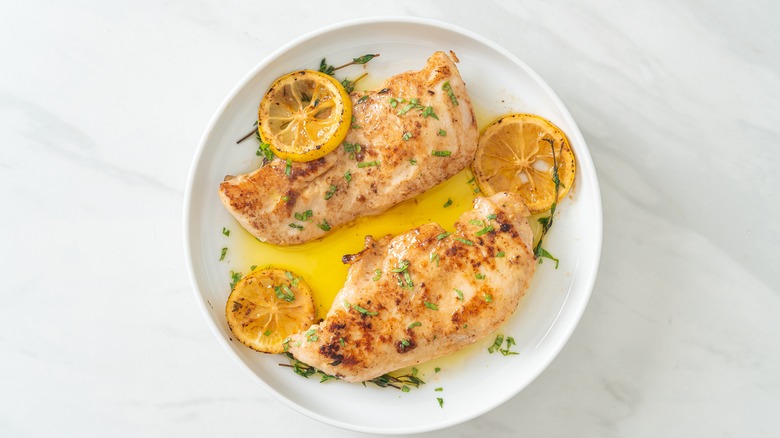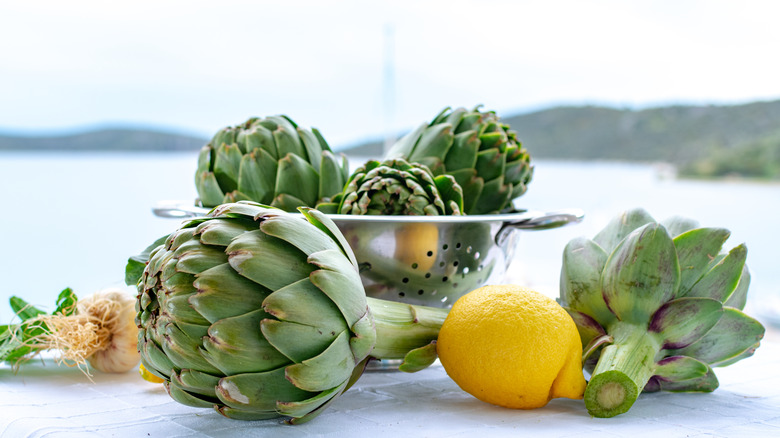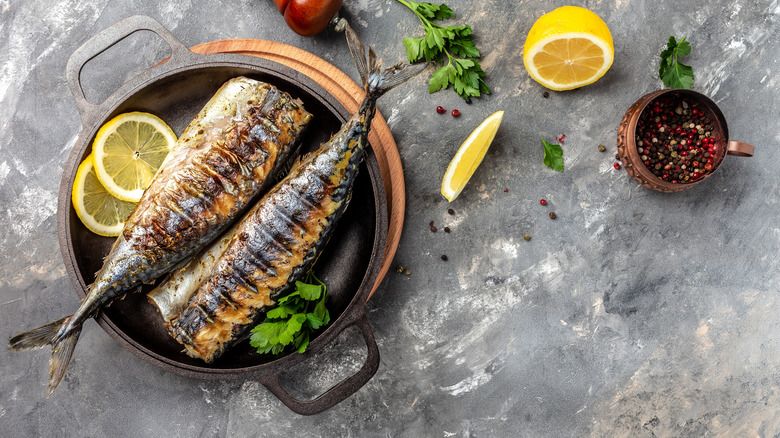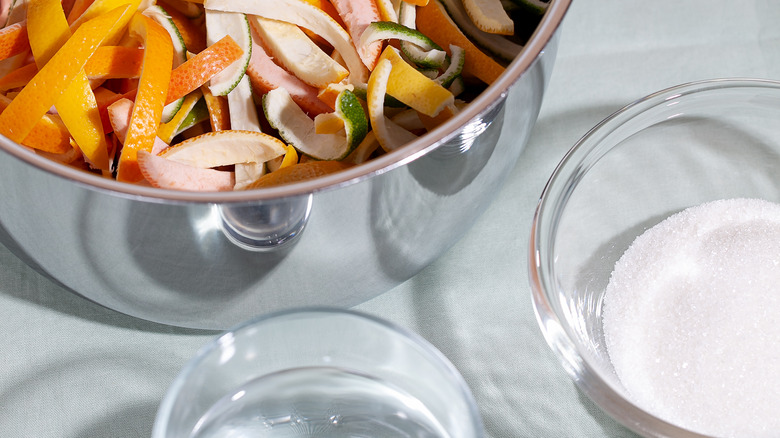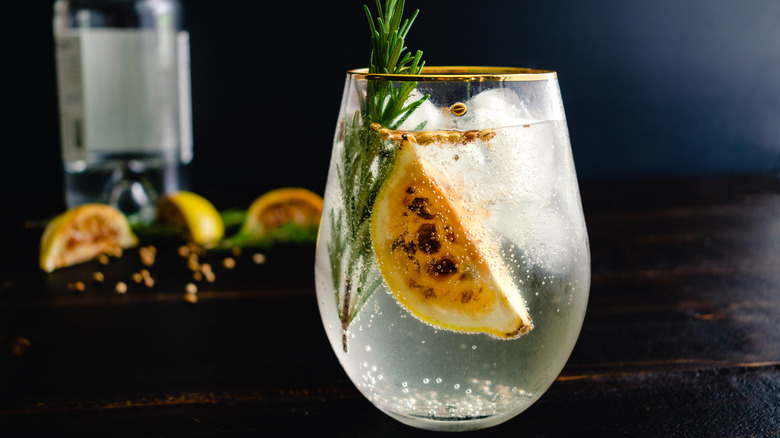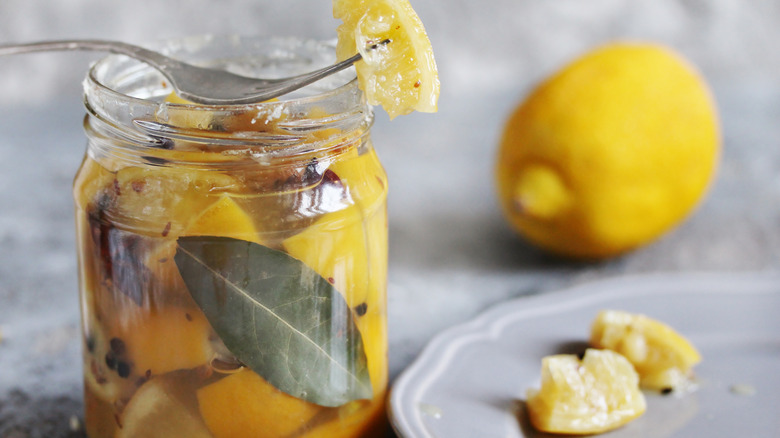Tips You Need When Cooking With Lemon
Once prized as a delicacy in royal courts and high temples, lemons are now a common and affordable ingredient that can easily add tons of flavor to any dish — especially when cooking Mediterranean, European, and Middle Eastern cuisines. Citrus grows very well in certain areas of the United States, mainly Florida and California, so we're lucky to benefit from the availability of lemons year-round. Adding a squeeze of this zesty fruit to your cooking may seem straightforward, but there are tons of tips that can help you really make the most of it.
That's why we've rounded up some of the best techniques for cooking with lemon. No matter what you're preparing — whether it's savory or sweet — there's bound to be something you can do to kick it up a notch with a lemon or two. Whether it's zesting, juicing, marinating, preserving, or candying, read on for some meal-changing tips using this brightly-hued fruit.
Fresh is best
Ever wonder why people will gladly pay two to three times more for freshly-squeezed lemonade? Freshly-squeezed lemon juice (and all citrus for that matter) is always going to taste better, and there's a scientific reason for that. The peel and flesh of lemons contain a volatile compound known as limonene. This free compound evaporates into the air quickly after being activated.
That doesn't mean that the citrus' juice has gone bad, but a lot of the complexities of the flavor will diminish. If you do need to make a bunch of lemon juice in advance, make sure you store it right. Keeping the juice in a tightly sealed mason jar (or another airtight container) will keep it as fresh as possible for a longer period of time. Unless you're in a true bind, avoid the bottled versions sold at the store — they're loaded with preservatives and chemicals.
Juice it right
Even culinary beginners probably feel that juicing a lemon is within their grasp, but there are some subtle nuances to this technique that can make all the difference in terms of efficiency and ease. For example, rolling a lemon under your hand (or using a rolling pin) can loosen some of the fruit inside and give you a better yield when it comes to liquid. After halving the lemon, you can use a citrus reamer or even a common fork to loosen up the flesh and release the juice. But if you want to extract the most juice possible, consider microwaving the lemon for 10 to 30 seconds before juicing.
Whichever way you decide to juice, you may have to contend with the seeds — especially when you want to juice half of the lemon straight into your dish. Rachel Ray squeezes the lemon half cut side up over an open hand to catch the seeds.
Use the right variety
When shopping for lemons, it's easy to think there is just one type available — that's because most grocery stores only stock one variety at a time. But ever since humans first began trading lemons in the second century, hundreds of varieties have been cultivated. In fact, there are over thirty types that are commonly grown around the world.
In most stores throughout the U.S., the pile of yellow lemons is usually either Lisbon or Eureka varieties. Both are commonly grown stateside and chosen for their good ratio of zest and skin to flesh. A more specialty variety of lemons that can be found seasonally are Meyer lemons. They're typically sweeter and more aromatic, which makes them great for using raw (like in relish or a salad). Some lesser-known varieties, like Buddha's Hand and Citron, are grown for the skin and zest and used commonly in baking and pastry recipes.
Buy the best ones
A crucial part of making the absolute most of any lemon you cook with is to choose the best possible one at the store or market. While choosing the right type of lemon is important, there can still be a wide range of variables to look for from fruit to fruit. In general, a lemon is ripe when it's yellow or yellowish-green and firm. The skin should be shiny and not at all wrinkly or mushy. Pale lemons may be a sign of an older fruit, so look for more vibrant options.
While lemons aren't known for being expensive, there are definitely places to find great, super-affordable lemons, such as bulk stores like Costco. This can be a great option if you plan to use a bunch for a special recipe, like lemon curd or lemonade. While lemons can be stored on the counter, they last much longer in the refrigerator.
Brighten up your cooking
Cooking with lemon goes far beyond just using the juice. The zest of a lemon is a great way to add lemon flavor to a dish without adding extra moisture or acidity. Both of these elements can wreak havoc on certain types of foods, like green vegetables — the moisture can interfere with browning (especially when roasting) and the acid can kill the green color. For other things, like dips, spreads, and oil-based sauces (think pesto), you want to avoid watering down the finished product. Lemon zest brings all the flavor to your dish without messing with the consistency and texture.
If you're not sure how to start using lemon zest in your cooking, there are tons of great recipes to spark your creativity. Vegetables, marinades, and even desserts can all benefit from this zesty boost. When cooking with it, just remember it can dry out quickly, so only zest right before adding it to your dish.
Avoid the pith
Once you've decided to use lemon zest in your recipe, the most important thing to remember is that the lemon peel (or rind) and the zest are different things. Whether using a microplane, grater, or peeler, you only want to take off the waxy yellow outermost layer of the lemon (that's the zest). Once you start to see the spongy white layer underneath, stop!
This part, known as the pith, is very bitter and will add that astringent flavor to your food. In a pinch, you can also use a box grater to remove the zest. Give the lemon a few swipes across the holes then check to see if you've reached the pith before moving on to a new patch. Once you've used the zest, you can either juice the lemon or save it for later. The zest protects the outside of the lemon from drying out, so keep it in the refrigerator wrapped in plastic until you're ready to use it.
Use it to tenderize meat
Marinating meat with lemon juice can be an extremely delicious way to add flavor to a meal. You may also find that when you marinate your meat with something acidic, the final result is more tender and juicy. That's because the enzymes in the fruit can also help to break down the proteins and tenderize them. It's a culinary win-win — you get tender meat and a boost of intense flavor.
Like with other cooking techniques, balance is everything. If you are using a marinade with lemon juice (or zest) on your meat, make sure there's a good harmony between that and the salt, fat, and other seasonings you add. Time is also an important factor, and you should try not to marinate your protein for longer than 24 hours. After that point, you run the risk of breaking down the protein completely and ruining the texture.
Balance salt with acid
Cooking with lemon and its juice means utilizing two different aspects of the lemon. There's the lemon flavor itself, and then the acidity of the juice. Acidic ingredients add a sour flavor when used in cooking. Mastering the art of cooking involves balancing the five basic tastes (salty, sweet, sour, bitter, umami), and the best-tasting dishes have a perfect harmony of flavor.
Acidity (the "sour" flavor) adds brightness and liveliness to any recipe it touches. It balances the other flavors, specifically sweet, as well as tempers the spiciness of hot foods. If you get a little carried away when seasoning, it can help correct an over-salted dish. The trick is to keep saltiness and acidity evenly matched to create a well-rounded flavor. Simply using one or the other will leave you with a "flat" tasting dish. Don't believe it? Try adding a pinch of salt to lemonade and see how it boosts the flavor.
Curb browning and limping
Lemon juice can do so much more than just add flavor to a dish. Certain types of produce are known to turn brown after being cut, such as apples and avocados. A chemical reaction occurs when the cells in the food are exposed to oxygen which causes the browning. Luckily, there's a quick fix. Lemon juice can stop fruits and vegetables from browning. That's because the citric acid present in lemon juice is a natural antioxidant.
If you need to cut or prepare a bunch of ingredients prone to browning ahead of time, just toss them with a little lemon juice to stop the process. You can also fill a bowl or pot with water and a bit of lemon juice and submerge the food in that. This works great for foods with a lot of nooks and crannies, like artichokes, because the acidic water can access every surface.
Give fish a nonstick coating
Fish and lemon are natural flavor friends, and there are tons of recipes utilizing the combination. Beyond just flavor, there's another cool way to use lemons when cooking fish. Anyone who has ever cooked fish knows that it has a tendency to stick to grill grates and roasting pans alike. The frustration of having chunks of fish stuck to your cooking surface can be enough to stop people from wanting to prepare it all together.
Luckily, there's one great hack to prevent sticking. Slice up a lemon and place the slices in between the fish and the cooking surface. Even thin slices will provide just enough distance to prevent the proteins in the meat from binding to the metal surface. An added bonus? The lemon slices will start to steam and add flavor to the fish while it cooks. The slices won't be edible after cooking, so just toss them when done.
Make a tasty compound butter
Another great trick for cooking with lemon is to make a flavorful compound butter. This easy yet oh-so-tasty cooking technique is a favorite among chefs who use it to coax flavor out of meat and vegetables using simple ingredients. Compound butter is simple to make — just soften some butter and fold in a combination of salt, pepper, spices, citrus zest, or herbs. Then, chill the butter into a log using parchment paper. When it's time to cook, just slice off a chunk as needed. It will keep this way in your refrigerator for at least a week, longer in the freezer.
Lemon zest is a great ingredient to use in compound butter because it brings a bright flavor to the fatty butter. You can use just the zest, like in this recipe for cornish game hens, or chop pieces of the whole lemon to fold into the butter, like in this recipe for bone marrow butter.
Candy the peels
Lemons have great applications when used in savory cooking, but what about sweets? Of course, you're probably familiar with all the different delicious desserts that incorporate this bright fruit like lemon pound cake, lemon meringue pie, and lemon bars. The problem is that most recipes use a ton of lemon juice and then you're left with all the rinds. Before you toss them in the trash, you should consider holding on to your leftover peels.
One way to use up the leftover peels is to zest them before juicing and then freeze the zest until they're ready to be incorporated into a dish. The easiest way is to freeze the zest on a baking sheet lined with wax paper, then transfer it to an airtight bag. Another way to use up the peels is to candy them. Candied lemon peels make a great snack or garnish for other baked goods, and they last for months.
Don't forget to char
Most times, when something we cook gets charred to a crisp, it's garbage. However, some foods can really benefit from the smoky caramelization that comes from a light char. Lemons are a great candidate for this treatment and have quickly become a new food trend. The sugars present in the flesh and juice of the lemon develop a deeper flavor that works great in everything from cocktails to vinaigrettes.
An easy way to try this technique is to throw two lemon halves onto the grill next time you cook meat or vegetables. Once the cut side is browned and slightly charred, remove. Just before serving, squeeze the charred lemon over everything and enjoy. Once you get a feel for cooking lemons this way, you can experiment further, like chopping the charred lemons for use in a sauce. Segments of the fruit can also be charred under the broiler in your oven for use in salads or whatever else you can dream up!
Preserve them for later
For as long as humans have cultivated lemons, we've needed ways to preserve them. Preserving lemons involves covering them with salt and lemon juice, along with some spices and other aromatics. They can be whole, halved, or quartered. This technique keeps them fresh for months and mellows the sharpness of the lemon and bitterness of the pith.
The flavor of preserved lemon is like regular lemon times ten. As we mentioned above, salt can elevate the flavor of acidic foods like lemon. Because preserved lemon is made with mostly lemon juice and salt, it's like a lightning rod of flavor when added to any dish. For cooking with preserved lemon, you can use the entire fruit — skin and all (just make sure to avoid any seeds). Keep in mind that when you add it to something, you should minimize the salt you use to avoid an overly salty dish.
